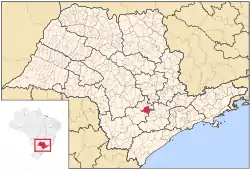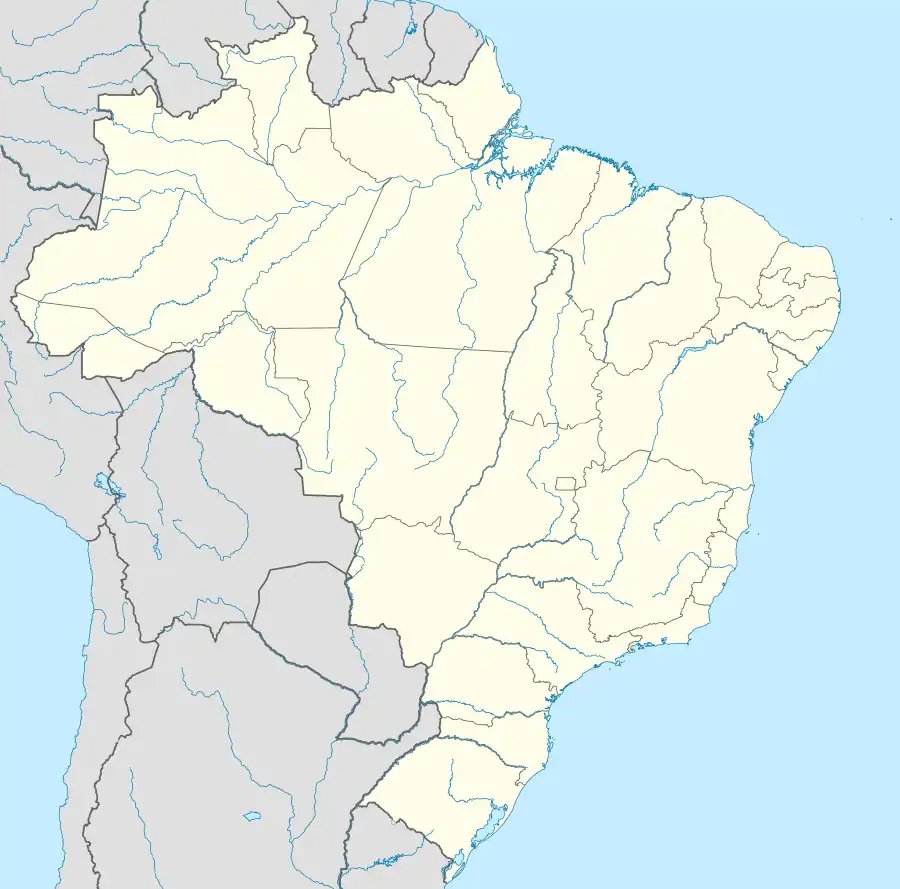Tatuí | |
|---|---|
Municipality | |
.jpg.webp) | |
 Flag  Coat of arms | |
| Motto: Per ardua svrrexi (Latin) | |
 Location in São Paulo state | |
 Tatuí Location in Brazil | |
| Coordinates: 23°21′20″S 47°51′25″W / 23.35556°S 47.85694°W | |
| Country | |
| Region | Southeast Brazil |
| State | São Paulo |
| Metropolitan Region | Sorocaba |
| Area | |
| • Total | 523.75 km2 (202.22 sq mi) |
| Population (2020 [1]) | |
| • Total | 122,967 |
| • Density | 230/km2 (610/sq mi) |
| Time zone | UTC-3 (BRT) |
| • Summer (DST) | UTC-2 (BRST) |
| Website | www |
Tatuí is a city located in São Paulo state, Brazil. It is part of the Metropolitan Region of Sorocaba.[2] The population is 122,967 (2020 est.) in an area of 523.75 km2.[3] Known as "Music City", the city has the largest music school in Latin America. Its name comes from Tupi language and means "Armadillos River". Weather: dry. Average temperature: 21 °C.
Education
One of the major schools in Tatuí is the technical school "Salles Gomes", offering secondary and technical courses of good quality. FATEC - Tatuí (São Paulo State Technological College).
History
Established: August 11, 1826. The village was founded in 1680 by the Pioneers (Bandeirantes) in their holdings on the inland. It is possible that the site had a significant concentration of Indians. In 1823 the city experienced an amazing surge of progress, with 800 buildings in the urban area and several manufacturing companies.
Music
Created by state law in 1951, and officially founded in 1954, the Conservatorio Dramatico e Musical Dr. Carlos de Campos, of Tatuí, represents one of the most successful achievements of the State of São Paulo, and perhaps of Brazil, in the music teaching field. Supported by the State Government, through its Secretaria de Cultura, the Conservatory is managed by AACT, a non-profit organization which employs over 300 teachers, musicians and administrative personnel distributed in the various areas of the institution, such as Classical Music, Orchestras, Big-bands, Brazilian Popular Music, Jazz, Drama and the art of making string instruments – the latter, one of the rare and the most important courses in the area in Brazil. By means of another State law, the city of Tatuí was nominated “The Capital of Music” in Brazil, due to the Conservatory's relevant performance in both artistic and pedagogic work.
Known as a center of excellence in music teaching in Latin America, the conservatory is located in the city of Tatuí, a pleasant town with a population of 117,000 inhabitants and situated 130 km from the capital of the state, São Paulo. The conservatory includes in its student body more than 3.000 youngsters from over 20 states in Brazil, and 67 from various countries, such as Peru, Paraguay, France, Japan and the United States. All courses offered are tuition-free, and for those students who come from distant places in Brazil or from other countries, free room and board may also be offered.
Some of the conservatory's former music students now belong to OSESP, Latin America's leading symphony orchestra, conducted by Pascal Tortelier, as well as other Brazilian symphonic groups. Many students have been awarded scholarships for study in the United States, where some of them now teach at local universities and/or play in various orchestras there, as well as in France and the United Kingdom. One such grant from the Karajan Foundation was given to at least two former students member of the Conservatório de Tatuí.
Among past alumni now performing and teaching successfully abroad is the acclaimed cellist Dr. Tania Lisboa, a permanent member of the Royal College of Music in London. Other students now residing and working professionally in Austria and Germany include Luis Garcia a former permanent horn player of the Berlin Staatskapelle under conductor Daniel Barenboim. The Conservatorio de Tatui is administered by its executive director, Prof. Dr. Henrique Autran Dourado (New England Conservatory of Music of Boston, USA), administrative and financial director, Dalmo Defensor (Economist at the University of São Paulo), pedagogic assistant, Antonio Ribeiro (State University of São Paulo, composer and researcher), and artistic assistant, Erik Heimann (Trinity College of London).
The Conservatory's music hall (Teatro Procopio Ferreira) presents over 300 performances per year, such as symphonic, jazz, Brazilian popular music, drama and shows. Events include various international festivals, such as the São Paulo version of RICE (Rio International Cello Encounter), International Early Music Encounter, and competitions such as the National Violin Making Concours, Spartaco Rossi Piano Competition among many others. At least, one master class is performed in the Theater, weekly, and guest conductors and soloists from other states and countries are frequently invited to perform with the Conservatory's Symphony Orchestra and Wind Ensemble.
Sports
Besides music, soccer is another great passion of the tatuians people, and they stand out among the elite four:
- Clube de Campo
- Santa Cruz
- XI de Agosto
- Realmatismo Esporte Clube
Notable people
- Mario Longhi, CEO of United States Steel from 2013 to 2017.
- Rodinei, football player, World runner-up. [4]
References
- ↑ IBGE 2020
- ↑ "Governo do Estado de São Paulo, Lei Complementar nº 1.241, de 8 de maio de 2014". Archived from the original on 18 October 2014. Retrieved 2015-09-29.
{{cite web}}: CS1 maint: bot: original URL status unknown (link) - ↑ "IBGE | Biblioteca | Detalhes | Sinopse estatística do Município de Rio Verde : Estado de Goiás : subsídios para o estudo da evolução política : alguns resultados estatísticos - 1945 : principais resultados censitários - 1-IX-1940 / Conselho Nacional de Estatística. -". biblioteca.ibge.gov.br.
- ↑ "Final da Libertadores: Tatuí se prepara para celebrar momento especial de Rodinei no Flamengo". Retrieved 2024-01-01.
External links
- (in Portuguese) Prefeitura de Tatuí | Site Oficial
- (in Portuguese) Home